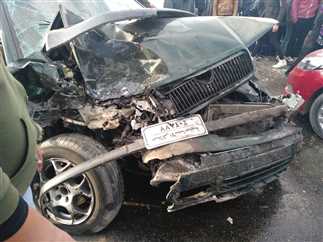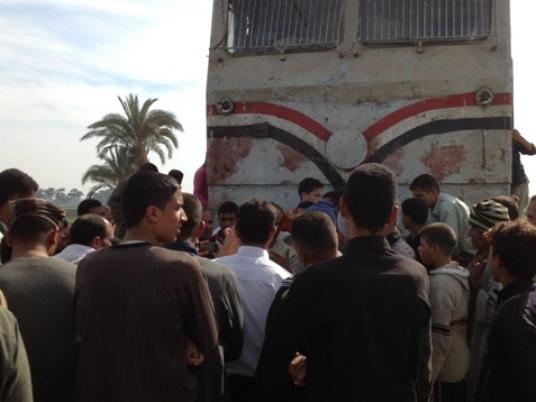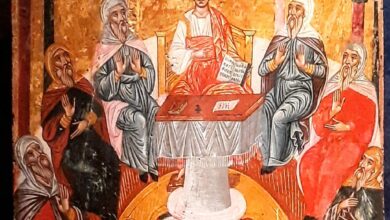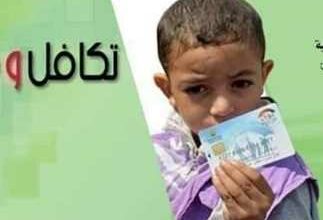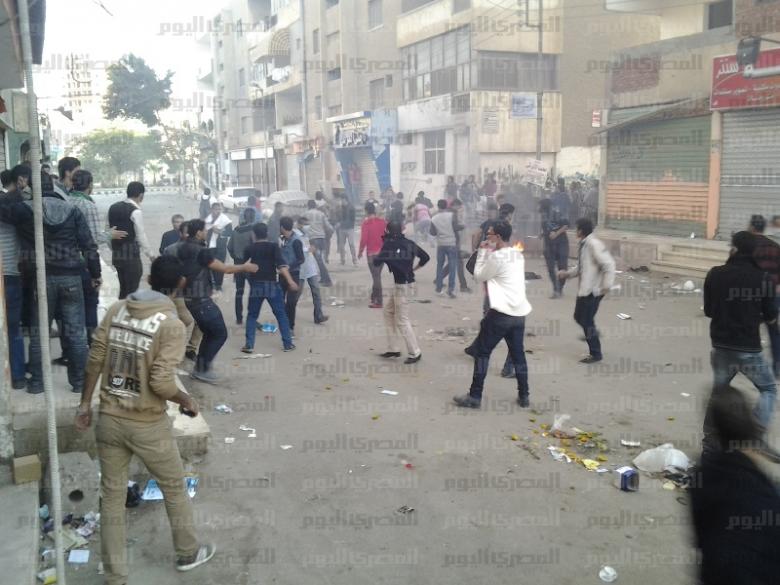
ZAGAZIG — The sirens of the modern electronic crossing at the entrance of Zagazig, the capital of Sharqiya Governorate, are drowned out by the honking as the train approaches. There’s no crossing guard in sight — the process is automated, giving visitors the sense that this is indeed the city of Egypt’s first civilian president.
Soon after the crossing, however, the scene changes dramatically as you enter the area where clashes between protesters and security forces have carried on for three days, just meters from the home of President Mohamed Morsy’s family. Residents of the building include his family, relatives and others who are not relations.
On 6 December, protesters marched from Zagazig University — about 300 meters from the Morsy family residence — denouncing the constitutional declaration through which Morsy claimed extra powers for himself, and the contentious draft constitution. Clashes soon broke out between protesters and security forces guarding the building.
While the clashes represented mounting opposition to the rule of the Brothers, the latter insisted they were a conspiracy from the old regime, echoing the moment when they described Morsy’s rival (and former Mubarak figure) Ahmad Shafiq’s victory in the presidential run-off in the Delta governorate as a plot against them.
It’s not safe at home
During the second day of clashes, violence spread to the center of the city, as the Freedom and Justice Party’s new headquarters and a traffic authority office were torched.
Central Security Forces were deployed, lining the road from the university all the way to Morsy’s house, where security measures were tightened. Plainclothes policemen, some of them Republican Guard officers, sat in front of the building and no photos were allowed in the area.
Omar Ahmed Fahmy, a teaching assistant at Zagazig University’s faculty of medicine and a resident in the same building, invited this Egypt Independent reporter into his father’s apartment Saturday. His father is Ahmed Fahmy, speaker of the Shura Council.
Upon entering the building, there were X-ray machines to scan bags of people entering. In the elevator, a poster of Morsy and the FJP had been defaced.
Inside Fahmy’s apartment hangs a photo of Hassan al-Banna, the founder of the Muslim Brotherhood, and an elegant clock with the FJP’s logo.
The younger Fahmy says security was not as tight directly after Morsy’s election. Morsy himself had literally brushed off his bodyguards when taking a symbolic oath on a stage in the middle of a packed Tahrir Square. That situation has changed over the past weeks.
There was initially less security in the area and less scrutiny of people entering and exiting the building, but, as protests escalated, “demonstrators started coming into the building on an almost daily basis,” he says. Security was quickly stepped up.
Until Thursday, protests in front of the building were peaceful, he recounts. “But then protesters tried to breach the barricades and assault security forces, which sparked the clashes,” he adds, arguing that it is often young boys who provoke the security forces into starting a fight.
The president’s family eventually evacuated the building Thursday, and security forces led clashes away from the building so the tear gas could not be smelled there, he says.
Genuine opposition
Omar Hesham, a student at Zamalek’s Faculty of Fine Arts who is originally from Zagazig, regularly coordinates protests in his home city. He says protesters and activists from different parties and movements know each other well and can mobilize quickly using their mobile phones and social media.
“We have an unofficial coalition of opposition youth and we are all university students. To mobilize protesters, we roam through the city and chant loudly for people to join us and they come down right away,” he explains.
In the marches, party slogans are absent despite there being several groups in Sharqiya, including the Revolutionary Socialists, the April 6th Youth Movement and the Popular Alliance, as well as the Constitution and Democratic Front Parties, among others.
Protests in the city since the issue of the constitutional declaration have been peaceful, Hesham says, but after the bloody clashes at the presidential palace in Cairo, tensions rose around the president’s house. The use of tear gas was excessive, and many protesters felt it was less about protecting the president’s house and more about suppressing the demonstration.
The Sharqiya clashes began Thursday, the day after a sit-in by Morsy opponents at the presidential palace was attacked by his supporters. A brief lull in the fighting on Friday morning was interrupted that afternoon, peaking when demonstrators set the traffic authority office next to Mabarra Hospital ablaze. Unknown assailants also burned a new and relatively unknown FJP office.
After the clashes, Hend al-Deeb, a member of the Revolutionary Socialists in Sharqiya, said a total of 30 people were arrested. Twenty were arrested Friday and released Monday, while another 10 were arrested Saturday and released immediately because they were minors.
A conspiracy
Tareq al-Gabry, a member of the FJP’s general secretariat and its youth secretary, says a distinction must be made between honest, patriotic youth and others who are paid to create chaos and sabotage buildings.
The main Brotherhood headquarters in Sharqiya is also located in Zagazig. In the absence of police, a small number of Brotherhood members stood at the gates to secure it. Another 20 were inside watching Misr 25, the Brotherhood’s satellite channel, looking visibly worried.
Now fitted with iron bars, stones had previously been hurled at the windows. Close by stood a trash bin filled to the brim with stones, ready in case of a possible attack.
“Some people from the former regime are trying to create chaos in the country and they use the opposition as a veneer for their sabotage. We know the revolutionary youth would never do that. We will use all peaceful and legitimate venues to express our opinion and protect our headquarters,” he says.
“It is better for us to see a thousand of our headquarters on fire than to see blood spilled,” adds Gabry.
He has filed reports against former ruling National Democratic Party members in Sharqiya and documented all the attacks on their office.
“This is a transitional period and it is normal for things like this to happen. We’re fighting with a regime that has its own men, money and satellite channels. We cannot accuse certain people though, we only report people who incite [violent] acts and ask the police to play their role in securing our offices,” says Gabry.
But it seems the police are unable to cope with the violence.
Attacks on police
One of the policemen who secured the FJP office that was attacked was himself assaulted, and his weapon was stolen.
Speaking on condition of anonymity, he says, “Our leaders have sold us out. They order us to secure places and hand us tear gas, while the assailants use birdshot.
“They are concerned about their ranks, so they give us nothing more than tear gas. They are afraid people will say police fired birdshot and killed people. These criminals are known to security forces and can easily be arrested, but they arrest them at night and the prosecution releases them in the morning. The security chief negotiates with the thugs and he lets them go.”
The policeman added that several of his colleagues were also injured.
“We do not want to secure the ruling party’s headquarters and again appear to be protecting the regime,” says the policeman. “We only want to protect people and our leaders should protect us because we, too, are human beings.”
This piece appears in Egypt Independent's weekly print edition.
This piece was translated from Arabic by Dina Zafer

